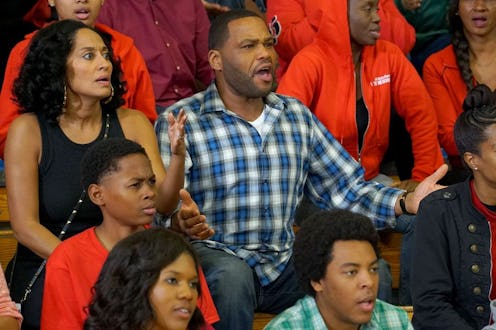Entertainment
'black-ish's March Madness Ep Comments On Class

After a two-week break, the latest black-ish episode doesn't have to follow its masterful "Black Lives Matter" mic-drop, but it's so good, it could have. Because subtly, black-ish examines class conflict in sports with a Hoop Dreams parody set in the suburbs, as the rich, entitled Johnsons are the establishment, and can't buy their way into sports success. Jack, despite his tiny stature, is extremely good at basketball, and the whole Johnson family gets into the game. Bow is excited to be an exalted hero mom without having to bring snacks. Zoe doesn't engage, preferring to flirt with the players. Junior becomes a passionate referee. Ruby leads the team in prayers that beg God to let the clumsy teammate stay home with the flu. Diane is responsible for the faux-documentary framing device.
Dre gets way too serious about the competition, signing Jack up for the more competitive "travel ball" league, which is primarily composed of black kids from poor neighborhoods, like his native Compton. Jack immediately goes from the star of the team to the benchwarmer. Dre is irate, and thinks he can easily train or bribe his son to an instantly better performance, but he can't.
But he's actually acting more entitled than their white neighbor, who's excitedly bringing her son to participate in the league. Even though Dre thinks of himself as a hood local, he and Bow are really the outsiders. They belong in the league coached by "Grown Man Baby Coach."
Eventually, Bow sits Dre down and the two open up about why they're pushing Jack so hard. Dre regrets quitting so many activities when he was growing up, so he decided to push his son into competing far above both his natural abilities and his desires. But in the end, all Jack wanted was to not be pushed so hard — he decides to stay in the tougher league without being a superstar in hopes of improvement.
This show is on fire right now, and not even a mostly character-driven episode like this one is without social commentary. The show makes a point to humanize Adonis Culpepper, the star player who's just hoping to make it out of the hood. His shoes are old, and he talks frankly about always being hungry. By adding this character and giving him a few moments, black-ish proves that it understands how the Johnsons come across — even if Dre & Bow are oblivious. Right after showing their struggles as a black family, following it up with an acknowledgement of their privilege is perfect.
Image: Byron Cohen/ABC